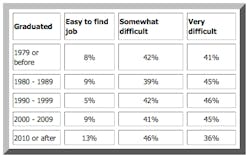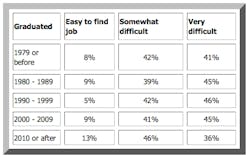RDH eVillage Salary Survey, part 1: Hygienists still think jobs are scarce
An RDH eVillage survey indicates that 77% of dental hygienists believe “too many graduates are looking for work.” While 13% of dental hygienists said they were unsure about the lack of job opportunities in their areas, less that 1% said there was a “shortage” of dental hygienists where they practice.
“So many hygienists looking for work in this area, and not enough jobs,” said a Michigan hygienist. “I haven't had a raise in five years. I feel like the doctor knows he can find someone to replace me tomorrow, so he doesn't feel the need to give a raise. Have had a resume out, but no luck.”
An Atlanta hygienist added, “The Atlanta area is saturated with hygienists looking for work, and employers know it. Salary increases are rare. I got my last pay raise 3 1/2 years ago, and the office manager's attitude is that she can make you do whatever she wants because you have nowhere else to go.”
More than 1,400 dental hygienists participated in the survey. The survey will provide statistics for upcoming articles regarding salary and benefit trends in the profession. So dental hygienists can still answer the questions here (if a reader has already answered the questionnaire, we politely ask that you do not complete a second time).
-----------------------------------------------------------------
Dental hygienists can answer 2014 salary survey questionnaire here
-----------------------------------------------------------------
Dental hygienists were asked about their observations on how difficult it would be to find employment in their area. The breakdown below is based on when the reader graduated from dental hygiene school.
A Minnesota hygienist noted, “There seems to be more job openings appearing. But many are still just part-time or have very irregular hours. They want you to be flexible. What does that mean exactly? I see this as a huge obstacle for those hygienists' with children who use day care.”
Dental hygienists who graduated between 1990 and 2009 log more hours working in their careers. The percentages of dental hygienists who practice more than 30 hours based on graduation from dental hygiene school are:
- Graduated before 1979, 46%
- Graduated between 1980 to 1989, 51%
- Graduated between 1990 to 1999, 58%
- Graduated between 2000 and 2009, 61%
- Graduated after 2010, 56%
Dental hygienists were asked if they would prefer to work fewer or more hours than they are currently scheduled. A majority among all age groups indicated satisfaction with current work schedules.
- Graduated before 1979, 66%
- Graduated between 1980 to 1989, 64%
- Graduated between 1990 to 1999, 63%
- Graduated between 2000 and 2009, 60%
- Graduated after 2010, 55%
The latter group consisting of the most recent graduates is worth keeping an eye on. Only 11% wished they worked fewer hours, compared to an average of 18% among the other age groups (RDH eVillage acknowledges that not all dental hygiene school graduates are the same age; however, a majority are within the same age range). In addition, among hygienists graduating after 2010, 31% wished they were working more hours a week (compared to 16% among other age groups).
A New York hygienist wrote, “Finding a full-time job is very difficult. The office I work for considers me as being full-time, but it is only 20 to 25 hours a week.”
About the Author

Mark Hartley
Mark Hartley is the editor of RDH magazine and collaborates with Kristine Hodsdon on many of the articles for RDH eVillage, which also appear on DentistryIQ.com.

